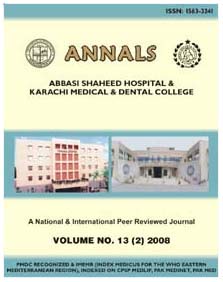
| |
| Home |
| Editorial Staff |
| Instruction to Authors |
| Journal-Issues |
| Policy |
| Newsletter |
| Copyright |
| IMPROVED FAT TOLERANCE IN POSTMENOPAUSAL WOMEN - A POSSIBLE ROLE FOR HORMONE REPLACEMENT THERAPY
NISHAT AYUB, SOHAIL R KHAN. ABSTRACT Objectives: The aim of this study was to evaluate the possible role of Hormone Replacement Therapy (HRT) in the handling of lipid stress by enhancing lipolysis and thus improving fat tolerance in women using the therapy after menopause. As a measure of the lipolytic capacity, we estimated the TG/HDL ratio, or the lipolytic index, since the lipolytic stress in the circulation, at any given time, is a function of the two parameters, triglycerides( TG ) and high density lipoproteins (HDL), i.e. the lipid load and the ability to remove it. Materials and Methods: A comparative study comprising 80 postmenopausal women, who fulfilled the inclusion criteria, was carried out. Subjects were divided into four groups according to type of hormone regimen used and their respective controls. Serum total triglycerides and HDL levels were estimated and the TG/HDL ratio calculated for four groups. Results: The difference noted in the mean values for serum HDL and TG/HDL ratios in users of oestrogen therapy and their controls prove to be statistically significant, P < 0.001 and P < 0.05 respectively. While comparison of mean values in users of a combined oestrogen and progestin regimen and their controls showed statistically significant differences in values of serum TG (P < 0.05) and serum HDL (P < 0.001). Conclusion: HRT while having beneficial effects on the circulating level of cholesterol rich lipoproteins, may also play an important role in preventing atherogenesis by enhancing the removal of the triglyceride rich particles from the circulation. Raised HDL levels in hormone users appear to contribute to improved fat tolerance and this effect would perhaps be more enhanced and relevant in the non-fasting state.
|
For Full text contact to:
|
|
Associate Professor, Department of Biochemistry Karachi Medical And Dental College, Karachi *
|

Copyright © 2009 Abbbas Shaheed Hospital and Karachi Medical & Dental College.
All rights reserved.
Designed & Developed by: Creative Designers